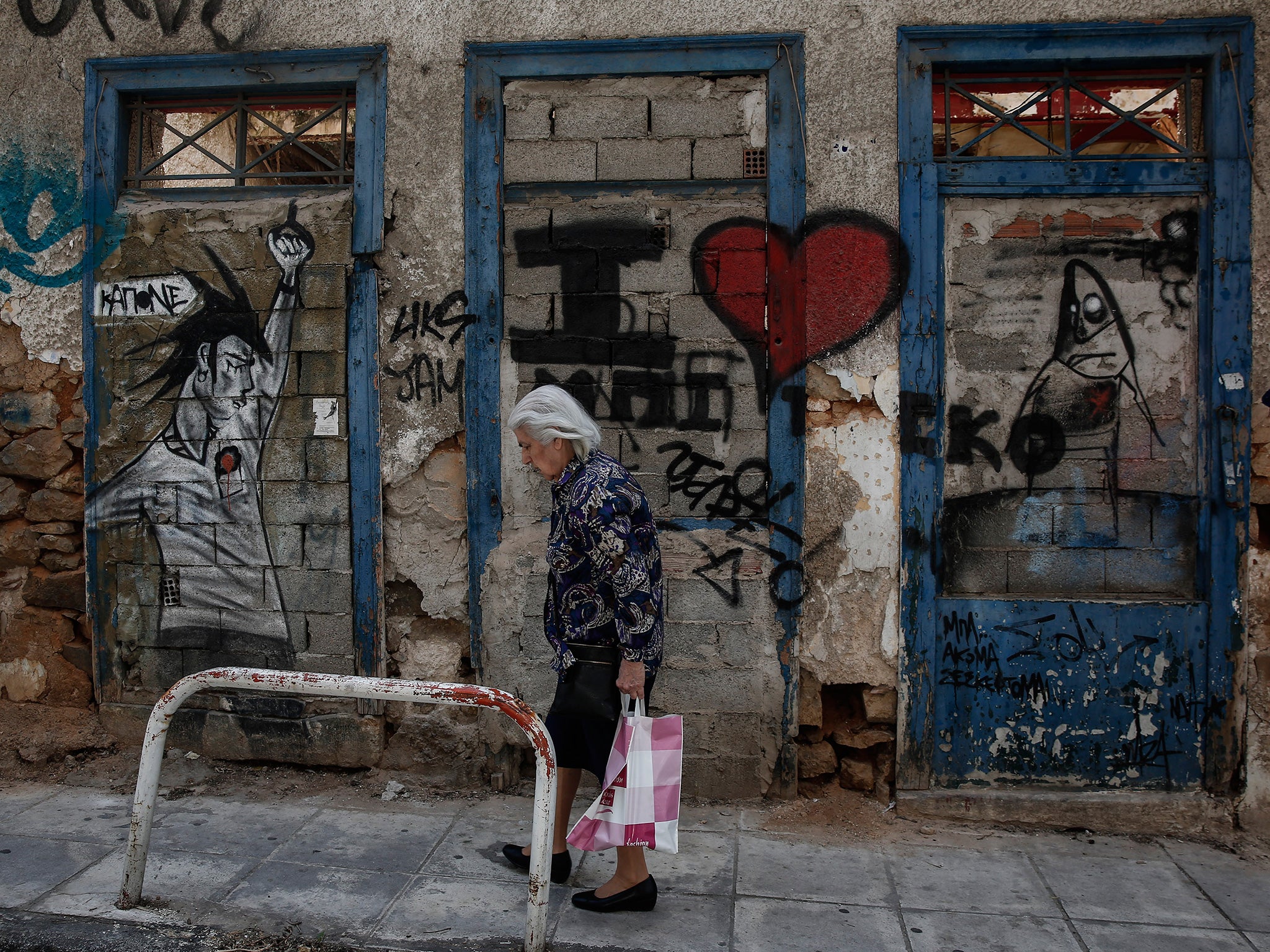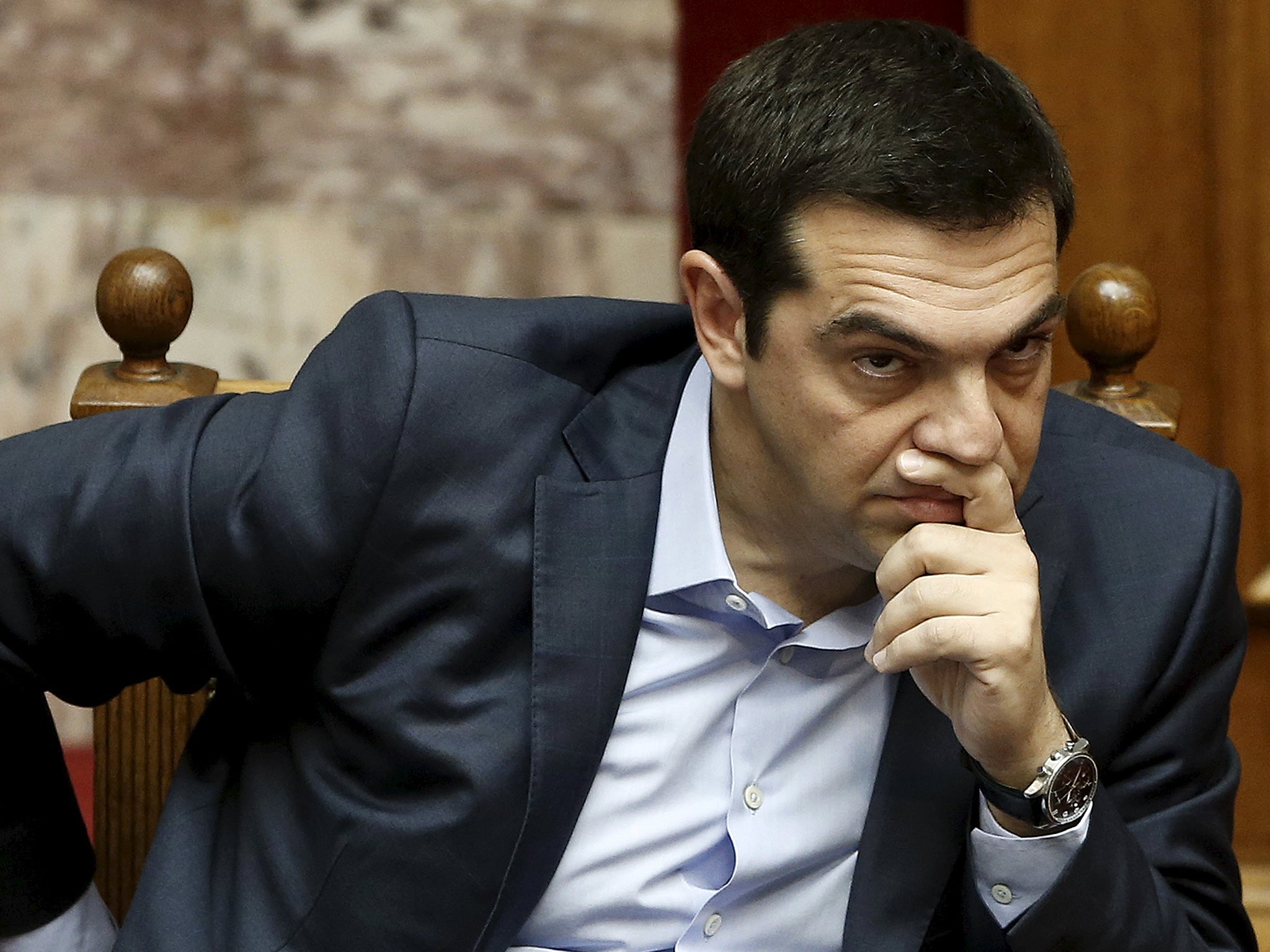Will this be the week when Greece’s future is decided?
The spectre of ‘Grexit’ is back - time up for the country’s single currency membership? Or yet another false alarm?

Your support helps us to tell the story
From reproductive rights to climate change to Big Tech, The Independent is on the ground when the story is developing. Whether it's investigating the financials of Elon Musk's pro-Trump PAC or producing our latest documentary, 'The A Word', which shines a light on the American women fighting for reproductive rights, we know how important it is to parse out the facts from the messaging.
At such a critical moment in US history, we need reporters on the ground. Your donation allows us to keep sending journalists to speak to both sides of the story.
The Independent is trusted by Americans across the entire political spectrum. And unlike many other quality news outlets, we choose not to lock Americans out of our reporting and analysis with paywalls. We believe quality journalism should be available to everyone, paid for by those who can afford it.
Your support makes all the difference.Greece has endured quite a few “last chance” weeks over the past five years. Another now looms. Is this yet another cry of “Grexit” wolf? Or could this really be the seven days that sees the Mediterranean country slip from the embrace of the single currency?
On 11 May, the eurozone’s 19 finance ministers gather in Brussels. They will attempt, yet again, to hammer out an agreement. The deal is simple: a commitment to serious domestic economic reforms in return for the release by Greece’s creditors of a €7.2bn (£5.3bn) bailout payment that the country needs to settle its bills.
Few expect success, though. Those officials preparing for the Brussels meeting suggest in private that the Greek side is still resisting reforms to pensions and VAT increases, while the creditors continue to refuse to release the money without a full commitment from Athens to these painful structural economic overhauls.
The very next day after the Eurogroup meeting, Greece is due to repay €750m to the International Monetary Fund. Diplomatic failure on Monday could conceivably be followed by a default on Tuesday.
That could trigger a decision by the European Central Bank (ECB) to stop accepting Greek bonds as collateral for the emergency lending to the country’s financial system. That, in turn, could prompt runs on Greek banks, the imposition of emergency capital controls, and, finally, the dreaded Grexit.

“Next week is set to be a crunch point, where making payments simply might not be possible,” says Ranko Berich at the foreign exchange company Monex Europe.
“Greece is nowhere nearer to agreeing the terms of its next bailout, raising the likelihood of a forced exit from the eurozone,” according to Azad Zangana of the asset management firm Schroders.
The UK’s National Institute of Economic and Social Research predicts that “if an agreement is not reached in the next few weeks, there is a significant risk of a Greek default and a disorderly exit from the monetary union”.
So can Greece make the Tuesday payment? Greek tax revenues have dwindled ever since January’s general election victory by the radical left party Syriza. The economy has slowed dramatically and is quite likely to be back in recession. The State is running out of money and has had to resort to drastic measures, like requisitioning the spare cash of local councils to keep paying its public-sector workers.
Greece’s Finance Minister, Yanis Varoufakis, has indicated that the country will have enough cash to meet Tuesday’s payment. But having already forked out €200m this week for an IMF payment, it will surely be a close-run thing. A Syriza MP, Nikos Manios, last weekend threatened a “credit event” (default) within a fortnight unless the Europeans back down.
Is this a bluff by the Greek side? Will they eventually capitulate in order to secure the cash? Some analysts think so. “Greece’s double-radical government is realising step by step how serious the situation is,” says Holger Schmieding of Berenberg bank. “We continue to see a 70 per cent probability that, possibly with quite some political noise in Athens in the meantime, Greece will strike a deal in the end and stay in the euro.”
Guillaume Menuet of Citi concurs: “We continue to believe the negotiating parties will come to an understanding, with reforms in the pension system and some changes in the labour market focusing on maintaining Greece’s competitiveness and fostering job creation, while respecting some of the symbolic Greek red lines.”
Yet even if Greece’s creditors do agree to release the €7.2bn and Greece manages to make Tuesday’s IMF payment, there could still be a fiscal accident that sets off a destructive cascade. The release of the cash would need to be approved by other national parliaments. This approval process could take weeks. Greece could quite conceivably, in the meantime, run out of cash to pay its public sector workers. Such a default could prompt panic that forces it out of the currency bloc.
Further, even if the €7.2bn materialises, Greece’s agonies will not end. The payment will only get the country through to the end of June. It was not intended to cover €6.7bn of bond redemption repayments that Greece is due to make to the ECB in July and August. For that, a whole new bailout deal has to be hammered out, possibly worth as much as €50bn. That’s on top of the €172bn bailout since 2010.
Negotiations for a new bailout are likely to be as fraught as this round, with further demands for structural reform. Another clock is ticking. Unless it is covered by a bailout, Greece’s banks will find themselves unable to access ECB emergency facilities, spelling probable default and Grexit.
Fans of nail-biting drama need not worry. If Greece does manage to make it through this week, another “last chance” moment will probably arrive in only 50 days’ time.
Join our commenting forum
Join thought-provoking conversations, follow other Independent readers and see their replies
Comments